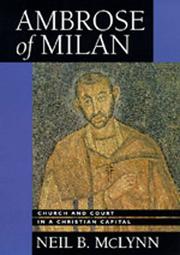| Listing 1 - 2 of 2 |
Sort by
|
Book
ISBN: 9783110747195 3110747197 9783110747355 9783110763249 3110763249 9783110764192 3110747359 3110764199 Year: 2021 Volume: 106 Publisher: Berlin: de Gruyter,
Abstract | Keywords | Export | Availability | Bookmark
 Loading...
Loading...Choose an application
- Reference Manager
- EndNote
- RefWorks (Direct export to RefWorks)
CSEL 107, the second part of the critical edition of Ambrose’s Orationes funebres, contains the two speeches that Ambrose held when his brother Satyrus died: the first he gave at the funeral, the second seven days afterward as an extensive treatise on resurrection. Alongside the issue of the work titles, the introduction to the edited text deals above all with how they have been passed down as manuscripts.
Oraisons funèbres --- Littérature chrétienne primitive --- Pères de l'Église. --- Histoire et critique. --- Auteurs latins. --- Ambroise --- Critique et interprétation. --- Funeral orations --- Christian literature, Early --- Speeches, addresses, etc., Latin --- Latin authors --- Ambrose, --- 2 AMBROSIUS MEDIOLANENSIS --- 276 =71 --- 276 =71 Latijnse patrologie --- 276 =71 Patrologie latine --- Latijnse patrologie --- Patrologie latine --- 2 AMBROSIUS MEDIOLANENSIS Godsdienst. Theologie--AMBROSIUS MEDIOLANENSIS --- Godsdienst. Theologie--AMBROSIUS MEDIOLANENSIS --- Oraisons funèbres --- Littérature chrétienne primitive --- Pères de l'Église. --- Bible --- Christian church history --- Classical Latin literature --- RELIGION / Christian Theology / History. --- Ambrose of Milan. --- Orationes funebres. --- Satyrus. --- ressurection. --- Ambroise, --- Emperor Gratian. --- Valentinian II. --- eulogies.

ISBN: 0520914554 0585139784 9780520914551 9780585139784 0520084616 9780520084612 Year: 1994 Publisher: Berkeley
Abstract | Keywords | Export | Availability | Bookmark
 Loading...
Loading...Choose an application
- Reference Manager
- EndNote
- RefWorks (Direct export to RefWorks)
In this new and illuminating interpretation of Ambrose, bishop of Milan from 374 to 397, Neil McLynn thoroughly sifts the evidence surrounding this very difficult personality. The result is a richly detailed interpretation of Ambrose's actions and writings that penetrates the bishop's painstaking presentation of self. McLynn succeeds in revealing Ambrose's manipulation of events without making him too Machiavellian. Having synthesized the vast complex of scholarship available on the late fourth century, McLynn also presents an impressive study of the politics and history of the Christian church and the Roman Empire in that period.Admirably and logically organized, the book traces the chronology of Ambrose's public activity and reconstructs important events in the fourth century. McLynn's zesty, lucid prose gives the reader a clear understanding of the complexities of Ambrose's life and career and of late Roman government.
Church and state --- Church history --- Apostolic Church --- Christianity --- Church, Apostolic --- Early Christianity --- Early church --- Primitive and early church --- Primitive Christianity --- Fathers of the church --- Great Apostasy (Mormon doctrine) --- Christianity and state --- Separation of church and state --- State and church --- State, The --- Ambrose, --- Ambrogio, --- Ambroise, --- Ambrosio, --- Ambrosius Mediolanensis, --- Ambrosius, --- Ambrosius von Mailand, --- Amvrosīĭ, --- Aurelio Ambrogio, --- Aurelius Ambrosius, --- Rome --- History --- Ambrogio --- Ambroise --- Ambrose --- Ambrosio --- Ambrosius Mediolanensis --- Ambrosius --- Ambrosius von Mailand --- Amvrosīĭ --- Aurelio Ambrogio --- Aurelius Ambrosius --- ambrose. --- auxentius. --- bishop of milan. --- bishop. --- catholic church. --- christian church. --- christian pliny. --- church doctrine. --- church history. --- church leaders. --- church politics. --- constantius. --- council of 355. --- council of aquileia. --- de fide. --- de spiritu sancto. --- easter crisis 386. --- exegesis. --- gratian. --- martyrs. --- palladius. --- penance. --- religion. --- religious leaders. --- rhetoric. --- roman emperors. --- roman empire. --- roman government. --- saint ambrose. --- saints lives. --- saints. --- sanctification. --- satyrus. --- theodosius. --- valentinian ii. --- western christianity.
| Listing 1 - 2 of 2 |
Sort by
|

 Search
Search Feedback
Feedback About UniCat
About UniCat  Help
Help News
News